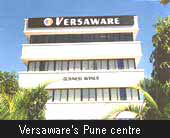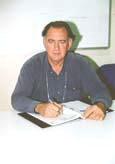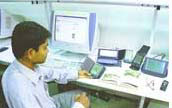Eternalising information
By Usha Somayaji | 27 Jan 2001
Paper is perishable and so is the information on it. But how do you save those centuries-old books and newspapers, a mute witness to our history and social evolution? Versaware, a New York-based e-publishing house, has the answer. The company is in the process of helping a leading south Asian daily digitise several million articles and images and bring them into a content management mode to be reformatted in any manner required and used as the newspaper deems fit.
And its being done here in Pune, the cultural capital of the Indian  state of Maharashtra. The Pune centre is Versaware's only production base outside the US. It already has 18,000 titles under content management, brought into a state where they can be instantly re-converted and re-purposed into any electronic format or product.
state of Maharashtra. The Pune centre is Versaware's only production base outside the US. It already has 18,000 titles under content management, brought into a state where they can be instantly re-converted and re-purposed into any electronic format or product.
Says Mr. Richard Pipe, chief executive officer of Versaware Technologies India. "We are not just digitising but also maintaining and supplying them in an open electronic book (OEB), XML as well as other formats."
This assignment marks a new area of business -- that of newspapers -- for Versaware. So far, Versaware has been into e-publishing for the book world and has helped digitise a whole gamut of content for the who's who in the publishing world. Some of the big names include Taylor & Francis, McGraw Hill, Random House, Lightning Source, Macmillan, Prentice Hall, Addison Wesley Longman, John Wiley & Sons, BBC -- the list is as long as is impressive.
Taylor & Francis got 17,000 old titles digitised. It has committed giving its future titles to be content managed by Versaware. While Versaware will also help sell books through order fulfilment from its own server, its digital warehouse will offer assistance in retrieving and reaching titles on demand.
With Lightning Source, the contract is to convert 300 to 1,000 books into half-a-dozen e-formats, every month. Random House required Versaware to convert their modern library collection of English classics into on-line formats, including PDF, Microsoft Reader, OEB, SoftBook and Pocketbook formats. Stanford University sought Versaware to convert their treasure trove of 118 rare books into the Versa electronic book format, extensively hyperlinking them into their existing database.
Recently, Versaware joined hands with BBC Worldwide in creating and launching its first electronic publication, On the Edge. Here, the e-book, made available in numerous formats, was used as a marketing tool by BBC to enhance interest in its ongoing BBC Two serial, Attachments, where the book by Rupert Smith presented the intimate confessions of Jake and Luce, two of its leading characters.
The company has achieved all this in a matter of 18 months, reaching a capacity to process 750,000 pages a month. From a mere 30 people in June 1999, the company has grown to 1,300 with plans to reach 4,000 by June 2001. Versaware has been inducting people at the rate of 30 a week, restricted only by its capacity to train new entrants. The company's revenue figure was $3.4 million last March, and expects to reach $9 million by March 2001, revving up capacities to reach $8 million per quarter by next year.
 "The secret of our success is we provide everything that the publishing industry needs," says Mr. Pipe. "Ours is not a sweat shop, not a mere data digitising or conversion house. What we offer is a range of value-added services that meet the end-to-end needs of the publishing industry," he proudly adds.
"The secret of our success is we provide everything that the publishing industry needs," says Mr. Pipe. "Ours is not a sweat shop, not a mere data digitising or conversion house. What we offer is a range of value-added services that meet the end-to-end needs of the publishing industry," he proudly adds.
Thus, apart from the basic digitising, Versaware provides services that include archiving, maintaining and managing the files through its different versions and variants, even offering processes for intellectual property rights management, distribution and e-commerce.
All this is carried out through Versaware's proprietary processes and tools -- 24 of which have patents pending -- including its conversion process. The process involves extraction of BookDNA, scanning and proofing process called Proof Positive (which, being image sensitive, is language-independent), rights management, e-commerce and other process modules.
Versaware does this first by converting printed matter into a digital database, "decomposing" the book into digital bits that Pipe likes to call, "Book DNA". This then can be converted or re-purposed into different electronic forms - PDF, Glass book, Pocketbook, Microsoft Reader, Versa electronic book, open electronic book, XML. Or it can be converted into dynamic new products that can create new revenue streams - CD-ROMs, content for websites and portals, electronic reference product, personal content managers, personalized libraries, even a print re-run.
Another value addition is that of media enhancement. "Most publishers don't have full rights over the images used in the publications," says Mr. Pipe. So the issue of property rights over them becomes a ticklish one. Versaware offers substitute images from their specially created media database so that publishers do not have to go through the rights procurement issue over media, again.
Once digitised, there is need to securely store the files, handle the version and variant control as they go through different editions, making them available to wholesalers, retailers, web sites and consumers.
Equally crucial is rights management. "Publishers don't always have total rights of the content. They might have the rights to a particular print edition, which do not necessarily mean they have the rights to sell it at other places as well," explains Mr. Pipe. Versaware maintains information on the complex rights owned by each publisher and making the process of managing such rights easy.
It also offers end-to-end commercial management and distribution, including print on demand files, shipping from one publisher's representative to the other and delivery fulfilment.
 The e-publishing advantages are many. E-books offer an archiving medium that can be preserved for posterity, which includes preserving the intellectual property rights. This aspect, in particular, appeals to comic book manufacturers who can convert all the images into electronic form and preserve them as high-quality digital files, almost permanently, unlike paper, which deteriorates over time.
The e-publishing advantages are many. E-books offer an archiving medium that can be preserved for posterity, which includes preserving the intellectual property rights. This aspect, in particular, appeals to comic book manufacturers who can convert all the images into electronic form and preserve them as high-quality digital files, almost permanently, unlike paper, which deteriorates over time.
E-books can be enhanced to make them come alive with pictures, sounds and hyperlinks, making them more interactive than paper books can ever be.
Yet, the e-publishing market is still at a nascent stage, and many a publisher is yet to latch on to the electronic bandwagon. One issue is of evolving technology, and continually changing formats. "Every publisher knows e-books are coming. The issue is, when? Publishers also have the problem of working out which format to make a commitment to, or if they should wait an watch."
Each format has its own merits and demerits. PDF, for example, is a simple, page-oriented format working fine for a novel and for print on demand, but doesn't work for larger databases, libraries, interactive books, on-line viewing, or any of the other features and business opportunities that electronic publishing has to offer.
Or, for instance, if the format of choice is Microsoft Reader, the plus point is that it has built strong on-line retailers, but it works solely on PC-based machines. It doesn't handle complex graphics and tables and has to be downloaded. What is required is a versatile approach, which will work even as technologies and formats keep changing, says Mr. Pipe.
But catch it will, and with a vengeance. Most large publishers have evolved a definite e-book strategy for the total content they already have, according to Mr. Pipe. A recent Arthur Andersen study commissioned by the Association of American Publishers projected the e-book market to be anywhere between $2.3 – 3.4 billion by 2005. According to the study, by that time, 62 per cent of the people will read e-books. Mr. Pipe, more conservatively, reckons it to be a $1 billion dollar business, while e-publishing on the whole could be a $7 trillion dollar business!
Three cheers to e-publishing.


















